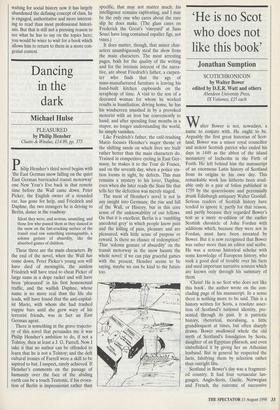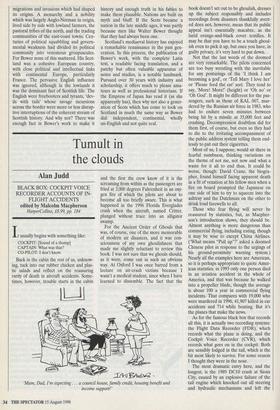He is no Scot who does not like this book'
Jonathan Sumption
SCOTICHRONICON by Walter Bower edited by D.E.R. Watt and others Aberdeen University Press, IX Volumes, £35 each Walter Bower is not, nowadays, a name to conjure with. He ought to be. Arguably the first great historian of Scot- land, Bower was a minor royal councillor and ardent Scottish patriot who ended his days in 1449 as the abbot of the island monastery of Inchcolm in the Firth of Forth. He left behind him the manuscript of an enormous Latin history of Scotland from its origins to his own day. This remarkable work has hitherto been avail- able only in a pair of folios published in 1759 by the quarrelsome and perennially drunk Edinburgh antiquary Walter Goodall. Serious readers of Scottish history have tended to ignore it, partly for that reason, and partly because they regarded Bower's text as a mere re-edition of the earlier Scottish chronicle of John Fordun with additions which, because they were not in Fordun, must have been invented by Bower. But it is now recognised that Bower was rather more than an editor and scribe. He was a serious historical scholar with some knowledge of European history, who took a good deal of trouble over his facts and used important narrative sources which are known only through his summary of them.
`Christ! He is no Scot who does not like this book', the author wrote on the con- cluding page of his manuscript. In a sense there is nothing more to be said. This is a history written for Scots, a resolute asser- tion of Scotland's national identity, pre- sented through its past. It is patriotic history, rhetorical, moralising, a little grandiloquent at times, but often sharply drawn. Bower swallowed whole the old myth of Scotland's foundpon by Scota, daughter of an Egyptian pharaoh, and even embellished it by giving her an Athenian husband. But in general he respected the facts, falsifying them by selection rather than outright fibs.
Scotland in Bower's day was a fragment- ed country. It had four vernacular lan- guages, Anglo-Scots, Gaelic, Norwegian and French, the outcome of successive migrations and invasions which had shaped its origins. A monarchy and a nobility which was largely Anglo-Norman in origin, lived side by side with lowland farmers, the pastoral tribes of the north, and the trading communities of the east-coast towns. Cen- turies of political squabbling and govern- mental weakness had divided its political community into venomous groupuscules. For Bower none of this mattered. His Scot- land was a cohesive European country, with close political and intellectual links with continental Europe, particularly France. The pervasive English influence was ignored, although in the lowlands it was the dominant fact of Scottish life. The English were freebooters and tyrants, 'dev- ils with tails' whose savage incursions across the border were more or less disrup- tive interruptions of the coherent stream of Scottish history. And why not? There was enough fact in Bower's work to make it history and enough truth in his fables to make them plausible. Nations are built on myth and bluff. If the Scots became a nation in the late middle ages, it was partly because men like Walter Bower thought that they had always been one.
Scotland's mediaeval history has enjoyed a remarkable renaissance in the past gen- eration. In this process, the publication of Bower's work, with the complete Latin text, a readable facing translation, and a patchy but often valuable apparatus of notes and studies, is a notable landmark. Pursued over 30 years with industry and scholarship, it offers much to please ama- teurs as well as professional historians. If the Empress of Japan has read it (as she apparently has), then why not also a gener- ation of Scots which has come to look on Scotland in much the same way as Bower did: independent, continental, wholly un-English and not quite real.



























































 Previous page
Previous page